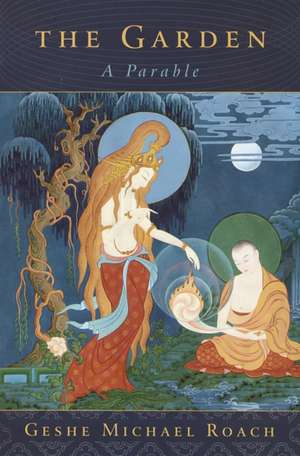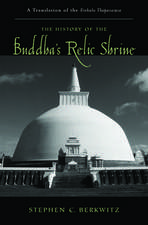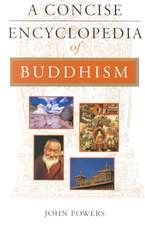The Garden: A Parable
Autor Geshe Michael Roach Robert Thurmanen Limba Engleză Paperback – 31 ian 2000
| Toate formatele și edițiile | Preț | Express |
|---|---|---|
| Paperback (2) | 90.31 lei 3-5 săpt. | |
| Continental Sales – 15 sep 2024 | 90.31 lei 3-5 săpt. | |
| IMAGE – 31 ian 2000 | 107.46 lei 3-5 săpt. |
Preț: 107.46 lei
Nou
Puncte Express: 161
Preț estimativ în valută:
20.56€ • 21.47$ • 17.02£
20.56€ • 21.47$ • 17.02£
Carte disponibilă
Livrare economică 14-28 martie
Preluare comenzi: 021 569.72.76
Specificații
ISBN-13: 9780385497893
ISBN-10: 038549789X
Pagini: 208
Dimensiuni: 142 x 210 x 12 mm
Greutate: 0.25 kg
Editura: IMAGE
ISBN-10: 038549789X
Pagini: 208
Dimensiuni: 142 x 210 x 12 mm
Greutate: 0.25 kg
Editura: IMAGE
Notă biografică
Michael Roach is a fully ordained Buddhist monk who received his geshe (Master of Buddhism) degree from Sera Mey Tibetan Monastery after twenty-two years of study. A teacher of Buddhism since 1981, he is also a scholar of Sanskrit, Tibetan, and Russian, and has translated numerous works. Geshe Michael received his undergraduate degree from Princeton University and worked in New York City as a director of a large diamond firm for many years. He founded and directs the Asian Classics Institute and the Asian Classics Input Project, and has been active in the restoration of Sera Mey Monastery. He lives in New York City.
Extras
The Sun
We met on the feast day of Thanksgiving. Our mothers were friends; her mother had four daughters, my mother had four sons, and they must have met in the market one day and planned the dinner together.
My brothers and I were working near the house that day. We didn't know much of the plan; we were trying to fix a cart, and covered in mud. The daughters rode in each in her own time--the first, the eldest, dismounting in the yard, found us peering out with our smudged faces from under the axle; she was extraordinarily beautiful, black hair, dark eyes. We continued to work halfheartedly after she entered the house, until the second daughter arrived--she was blond, with a strong build, and just as striking. By this time we were up on our feet, trying to brush some of the road off our clothes.
The third appeared then, as if it were a fairy tale, with russet hair, and a laughing face and eyes. Her glance as she passed us to where my mother stood at the front door was enough to make us forget the cart, and begin washing our hands and faces in the trough. Then on a small wagon came the mother, and sitting next to her the last daughter, slender and quiet, with golden curls, and truly seeming like the sun, as the sunlight struck her face, reaching over the back of the house, as the other sun set in red and gold. Then we were all in the home, warm, with candles and meal, and the fragrance of the sisters.
The next morning there was a small pot left behind from one of the dishes they had brought, perhaps the first of accidents that through the course of an entire life seemed less and less like accidents to me. My mother turned and suggested I return it, and looked at me, and again it seemed that in her eyes she was telling me that I should go, and that there was an important reason to be going. I went.
Her mother too looked at me with the same eyes, as she opened the door, and I held out the pot, but in a way that put me a bit inside the door, enough to engage her in some small conversation, which it seemed was planned anyway. And I asked her if the golden daughter could go walking a few nights hence, and she smiled softly, gazing at my eyes with her kind brown eyes, and said that would be good.
First I led by the ways I knew, and she came along, and I felt proud that she did not deny my arm, and the brush of her hair on my shoulder prevented me from seeing much of the way. Then soon we were on another path, one I did not know, and it was quite dark, one of the early winter evenings in the desert where we lived.
This moment marks the beginning of my schooling, not in things of books and classrooms, where I had already spent much time, but in the things that truly matter in the life of a person, and the things that, when we grow older, we realize are most important--the things of the spirit. It was at this moment that I first saw face-to-face the great enemy of humankind, and she showed me, and showed me too the golden warrior who would defeat this enemy, if death does not come first.
She led me into a garden, of stone walls, closed on the western side by a small stone chapel, but all I really saw that first night was a great tree, rare in the desert, with a great wide trunk, and high boughs drooping down, like a cover, against the night, and against the world outside. I leaned my back against the tree, and she pressed herself to me, and along the length of her leg against my own I felt an intense burst of heat, as though it were sunlight itself, an almost supernatural heat, which I have rarely ever since felt come from a human form.
It came into my mind to tell her something of my studies, some ideas from the books I had been with, and to impress her with my schoolboy learning, and to tell her of my growing fame in the school. I opened my mouth to speak...
She gazed up, with luxurious doe brown eyes, eyelids half closed, as if experiencing some pleasure I could not see; and I could not speak. I understood only with those languid eyes that my real lesson lay not in the studies, but in mastering myself and my own pride. This I learned at the age of sixteen, from this young girl of younger years, and as if by reward she rubbed her cheek against my chest, and the luxuriant golden hair poured over me, like a waterfall.
I was moved, in a way new for me, and this was the first moment that I knew lust, who would become from that moment on a great and worthy foe throughout my life. I reached my hands up to touch her small breasts, and again the eyes came up to me, open slightly wider, this time with a slight glint of sternness, and I found I could not move my hands. And from these eyes in that moment I learned a second lesson, and felt my heart enter a second place, a kind of goodness.
And she turned, and took my hand, and bade me leave the garden with her, still not having spoken a single word. With that there welled up within me some kind of disappointment, and a hurt; and the moment these feelings made themselves known to me she stopped, and wheeled around, and looked a third time.
I cannot describe what I saw, but I can give some hints; a golden Angel, standing fully erect, arms slightly raised from Her side, palms out toward me, and the golden hair glowing down, framing Her face like a halo, and the face itself glowing in the light of the moon coming from above the carob tree behind us, and soft silken blouse and skirt flowing slightly in the desert wind, and--again the eyes, asking me what right I had to anger, now, or ever again; with Her, or with any living being at all; and was it not my reason for being in this life, at the beginning of this life, at that moment, and from that moment on, only to learn to defeat the darkness of my own mind, and to give life, never-ending life, to the golden light within it.
With this She began my life, as I will tell it here, and as we parted said only, "Go touch the Sun; She will not harm you."
We met on the feast day of Thanksgiving. Our mothers were friends; her mother had four daughters, my mother had four sons, and they must have met in the market one day and planned the dinner together.
My brothers and I were working near the house that day. We didn't know much of the plan; we were trying to fix a cart, and covered in mud. The daughters rode in each in her own time--the first, the eldest, dismounting in the yard, found us peering out with our smudged faces from under the axle; she was extraordinarily beautiful, black hair, dark eyes. We continued to work halfheartedly after she entered the house, until the second daughter arrived--she was blond, with a strong build, and just as striking. By this time we were up on our feet, trying to brush some of the road off our clothes.
The third appeared then, as if it were a fairy tale, with russet hair, and a laughing face and eyes. Her glance as she passed us to where my mother stood at the front door was enough to make us forget the cart, and begin washing our hands and faces in the trough. Then on a small wagon came the mother, and sitting next to her the last daughter, slender and quiet, with golden curls, and truly seeming like the sun, as the sunlight struck her face, reaching over the back of the house, as the other sun set in red and gold. Then we were all in the home, warm, with candles and meal, and the fragrance of the sisters.
The next morning there was a small pot left behind from one of the dishes they had brought, perhaps the first of accidents that through the course of an entire life seemed less and less like accidents to me. My mother turned and suggested I return it, and looked at me, and again it seemed that in her eyes she was telling me that I should go, and that there was an important reason to be going. I went.
Her mother too looked at me with the same eyes, as she opened the door, and I held out the pot, but in a way that put me a bit inside the door, enough to engage her in some small conversation, which it seemed was planned anyway. And I asked her if the golden daughter could go walking a few nights hence, and she smiled softly, gazing at my eyes with her kind brown eyes, and said that would be good.
First I led by the ways I knew, and she came along, and I felt proud that she did not deny my arm, and the brush of her hair on my shoulder prevented me from seeing much of the way. Then soon we were on another path, one I did not know, and it was quite dark, one of the early winter evenings in the desert where we lived.
This moment marks the beginning of my schooling, not in things of books and classrooms, where I had already spent much time, but in the things that truly matter in the life of a person, and the things that, when we grow older, we realize are most important--the things of the spirit. It was at this moment that I first saw face-to-face the great enemy of humankind, and she showed me, and showed me too the golden warrior who would defeat this enemy, if death does not come first.
She led me into a garden, of stone walls, closed on the western side by a small stone chapel, but all I really saw that first night was a great tree, rare in the desert, with a great wide trunk, and high boughs drooping down, like a cover, against the night, and against the world outside. I leaned my back against the tree, and she pressed herself to me, and along the length of her leg against my own I felt an intense burst of heat, as though it were sunlight itself, an almost supernatural heat, which I have rarely ever since felt come from a human form.
It came into my mind to tell her something of my studies, some ideas from the books I had been with, and to impress her with my schoolboy learning, and to tell her of my growing fame in the school. I opened my mouth to speak...
She gazed up, with luxurious doe brown eyes, eyelids half closed, as if experiencing some pleasure I could not see; and I could not speak. I understood only with those languid eyes that my real lesson lay not in the studies, but in mastering myself and my own pride. This I learned at the age of sixteen, from this young girl of younger years, and as if by reward she rubbed her cheek against my chest, and the luxuriant golden hair poured over me, like a waterfall.
I was moved, in a way new for me, and this was the first moment that I knew lust, who would become from that moment on a great and worthy foe throughout my life. I reached my hands up to touch her small breasts, and again the eyes came up to me, open slightly wider, this time with a slight glint of sternness, and I found I could not move my hands. And from these eyes in that moment I learned a second lesson, and felt my heart enter a second place, a kind of goodness.
And she turned, and took my hand, and bade me leave the garden with her, still not having spoken a single word. With that there welled up within me some kind of disappointment, and a hurt; and the moment these feelings made themselves known to me she stopped, and wheeled around, and looked a third time.
I cannot describe what I saw, but I can give some hints; a golden Angel, standing fully erect, arms slightly raised from Her side, palms out toward me, and the golden hair glowing down, framing Her face like a halo, and the face itself glowing in the light of the moon coming from above the carob tree behind us, and soft silken blouse and skirt flowing slightly in the desert wind, and--again the eyes, asking me what right I had to anger, now, or ever again; with Her, or with any living being at all; and was it not my reason for being in this life, at the beginning of this life, at that moment, and from that moment on, only to learn to defeat the darkness of my own mind, and to give life, never-ending life, to the golden light within it.
With this She began my life, as I will tell it here, and as we parted said only, "Go touch the Sun; She will not harm you."
Descriere
Roach introduces Westerners to the wisdom of Tibetan Buddhism through a parable in which a man is lured to a mystical garden to meet the historical figures who have contributed fundamental teachings to the religion. Foreword by Robert Thurman.















